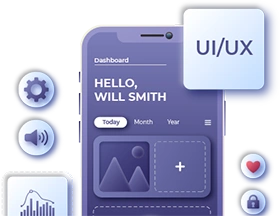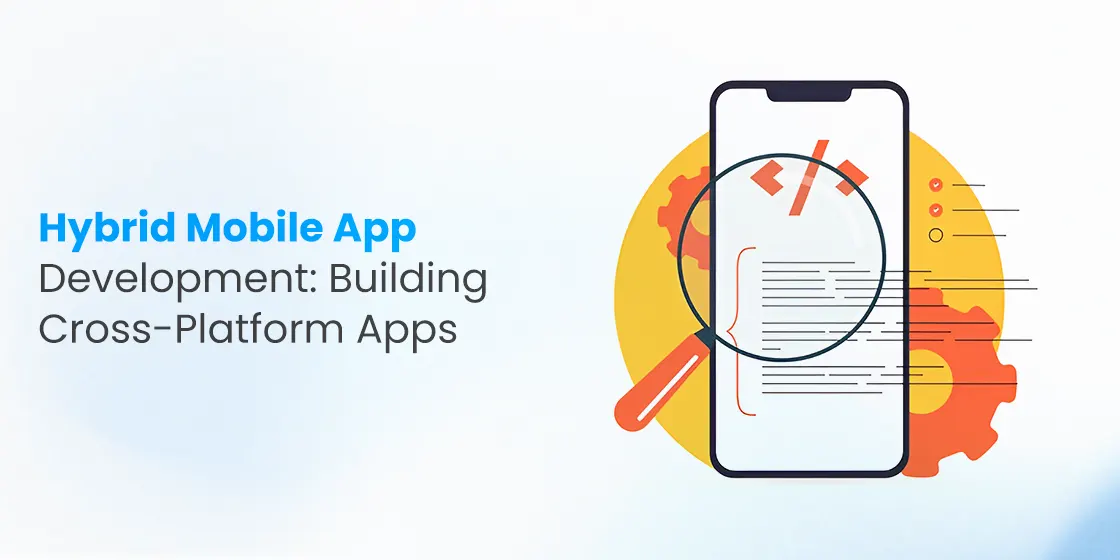Table of Content
Discover the Comprehensive Guide to Creating a Multi-Platform Mobile App in 2025
The mobile app development landscape has transformed dramatically, with businesses seeking efficient ways to reach audiences across multiple platforms without breaking their budgets. Hybrid mobile app development has emerged as a powerful solution, combining the best elements of native and web applications to deliver cost-effective, scalable solutions that work seamlessly on both iOS and Android devices.
In today’s competitive digital market, where mobile apps generated over $522 billion in revenue in 2024, choosing the right development approach can make or break your project’s success. With 7.49 billion mobile users expected by 2025 and 92.3% of internet users browsing on smartphones, hybrid app development offers an attractive pathway for businesses to maximize their reach while minimizing development costs and time-to-market.
Discover why hybrid mobile app development has gained a significant following in the app world today, and how you too can benefit from it just like professional mobile app development services today. Let’s begin.
Turn your concepts into mobile apps brimming with advanced features. From inception to deployment, make a distinct impact in the market.
Contact Now
Understanding Hybrid Mobile App Development
Hybrid mobile app development represents a revolutionary approach to creating applications that function across multiple platforms using a single codebase. This methodology combines web technologies like HTML5, CSS, and JavaScript with native container elements, allowing developers to build applications that can run on iOS, Android, and other operating systems without requiring separate development efforts for each platform.
Unlike traditional native development, which demands platform-specific programming languages and separate development teams, hybrid mobile app development leverages frameworks that wrap web-based code in native containers. This approach enables access to device features like cameras, GPS, and push notifications while maintaining the flexibility and cost-effectiveness of web development. The result is applications that deliver near-native performance while significantly reducing development time and resources.
The technology behind hybrid mobile app development relies on WebView components that display web content within native app shells. Modern frameworks like React Native, Flutter, and Ionic have refined this process, offering robust tools that bridge the gap between web and native functionality. This evolution has made hybrid development increasingly attractive for businesses seeking to balance performance, cost, and development speed.
Top Hybrid Mobile App Development Frameworks for 2025
The success of any hybrid mobile app development project largely depends on choosing the right framework. Current market leaders offer distinct advantages and cater to different project requirements and team capabilities.
React Native

React Native continues to dominate the hybrid app development space with a 29% adoption rate among developers. Created by Facebook, this framework enables developers to build mobile applications using JavaScript while achieving near-native performance. React Native’s strength lies in its extensive library ecosystem, strong community support, and the ability to reuse code across platforms. Major applications like Facebook, Instagram, and Skype leverage React Native for their mobile solutions.
The framework excels in projects where teams have existing JavaScript expertise and need to integrate with web-based systems. React Native’s component-based architecture and hot reloading capabilities significantly accelerate development cycles. That makes it an ideal choice for rapid prototyping and iterative development approaches, and why you should hire React Native developers today.
Flutter

Flutter has rapidly gained momentum, capturing 42% of developer adoption according to recent surveys. Google’s open-source framework uses the Dart programming language and offers exceptional UI customization capabilities through its widget-based architecture. Flutter compiles to native ARM code, delivering impressive performance that rivals native applications while maintaining consistent user experiences across platforms.
Flutter’s advantages include its hot reload functionality, extensive UI component library, and strong backing from Google ensuring regular updates and long-term support. The framework particularly excels in projects requiring custom animations, complex UI designs, and consistent branding across platforms. Companies like Google Ads, Alibaba, and BMW have successfully implemented Flutter for their mobile applications.
Benefits of Hybrid Mobile App Development
The advantages of hybrid mobile app development extend far beyond simple cost savings, offering strategic benefits that align with modern business requirements and market demands. Let’s take a look at how hybrid and cross-platform app development can benefit you today.
Cost-Effectiveness
It represents the most compelling advantage of hybrid app development. Organizations can reduce development costs by 30% to 50% compared to native approaches, with total project expenses ranging from $20,000 to $100,000 instead of $50,000 to $250,000 per platform for native development. This reduction stems from the single codebase approach, which eliminates the need for separate iOS and Android development teams and reduces ongoing maintenance requirements.
The financial benefits extend beyond initial development costs. Hybrid mobile app development simplifies updates and feature additions, as changes need implementation in only one codebase rather than multiple platform-specific versions. This streamlined approach significantly reduces long-term maintenance costs and accelerates the deployment of new features and bug fixes.
Faster Time-To-Market
It provides crucial competitive advantages in today’s rapidly evolving digital landscape. Hybrid development can reduce project timelines by up to 50% compared to native approaches, enabling businesses to launch their applications simultaneously across multiple platforms. This speed advantage proves particularly valuable for startups and businesses operating in fast-moving markets where early entry can establish market leadership.
The accelerated development process also facilitates rapid prototyping and testing, allowing teams to validate concepts and gather user feedback more quickly. This iterative approach enables data-driven decision-making and reduces the risk of developing features that don’t resonate with target audiences.
Challenges and Limitations in Hybrid Development
While hybrid mobile app development offers numerous advantages, understanding its limitations ensures realistic expectations and proper project planning. Despite these challenges, careful planning, appropriate framework selection, and realistic scope definition can mitigate most limitations while preserving the core advantages of hybrid development.
Performance Considerations
It remain the most significant challenge in hybrid app development. Applications running within WebView containers introduce an additional processing layer that can impact performance, particularly for graphics-intensive applications or complex animations. While modern frameworks have significantly improved performance capabilities, hybrid apps may still lag behind native applications in resource-intensive scenarios.
However, these performance limitations primarily affect applications requiring high-end graphics processing or real-time gaming functionality. For most business applications, e-commerce platforms, and content-driven apps, hybrid performance proves more than adequate for user needs and expectations.
Platform-Specific Limitations
It can restrict access to the latest device features and operating system capabilities. While hybrid frameworks provide extensive plugin libraries for accessing device hardware, some cutting-edge features may require custom native development or may not be immediately available in hybrid environments.
User Experience Consistency
These challenges arise when attempting to replicate platform-specific design patterns and user interface elements. While hybrid frameworks offer extensive UI component libraries, achieving pixel-perfect native appearance across all platforms requires careful design consideration and potentially platform-specific customizations.
Essential Technologies and Tools
The hybrid mobile app development ecosystem encompasses various frameworks, tools, and technologies that streamline the development process and enhance application capabilities.
Apache Cordova

Apache Cordova serves as the foundation for many hybrid development approaches, providing the bridge between web technologies and native device capabilities. This open-source framework enables developers to package HTML, CSS, and JavaScript applications into native containers while providing extensive plugin libraries for accessing device features like cameras, GPS, and file systems.
Cordova’s strength lies in its maturity, extensive documentation, and broad plugin ecosystem. The framework supports multiple platforms and provides reliable access to device capabilities, making it suitable for straightforward business applications and content-driven apps.
Ionic Framework

Ionic builds upon Cordova’s capabilities while providing a comprehensive UI component library and development tools. Ionic specializes in creating applications that closely mimic native user interface patterns, offering platform-specific styling and behavior adaptations. The framework supports integration with popular web frameworks like Angular, React, and Vue.js.
Ionic’s advantages include rapid prototyping capabilities, extensive pre-built components, and strong community support. The framework particularly excels in creating business applications, progressive web apps, and content management systems that require consistent functionality across platforms.
Performance Optimization Strategies
Maximizing hybrid app performance requires strategic planning and implementation of optimization techniques and software quality management throughout the development process.
Code Optimization
It forms the foundation of high-performing hybrid applications. Developers should minimize JavaScript execution time, optimize image assets, and implement efficient data management strategies. Lazy loading techniques, code splitting, and resource compression can significantly improve application responsiveness and reduce memory usage.
Modern hybrid frameworks provide built-in optimization tools, including tree shaking for removing unused code, ahead-of-time compilation for improved startup performance, and intelligent bundling strategies that reduce application size while maintaining functionality.
Memory Management
Memory management becomes crucial in hybrid environments where applications share resources with WebView components. Implementing proper garbage collection practices, avoiding memory leaks through careful event listener management, and optimizing asset loading can prevent performance degradation over extended usage periods.
Network Optimization
These strategies enhance user experience, particularly in environments with limited connectivity. Implementing intelligent caching mechanisms, optimizing API calls through request batching, and providing offline functionality ensures consistent performance across varying network conditions.
Regular Testing
Regular performance testing across different devices and operating system versions identifies potential bottlenecks and ensures consistent user experiences. Automated testing tools and performance monitoring solutions provide ongoing insights into application behavior and user experience metrics.
Security Considerations in Hybrid Apps
Security implementation in hybrid mobile app development requires comprehensive strategies that address both web and native vulnerabilities while maintaining user trust and regulatory compliance.
Data Protection
These measures must account for the dual nature of hybrid applications, implementing encryption both for local storage and network communications. Secure coding practices prevent common web vulnerabilities like cross-site scripting (XSS) and cross-site request forgery (CSRF) while ensuring proper authentication and authorization mechanisms.
Hybrid applications should implement certificate pinning for secure network communications, use secure storage mechanisms for sensitive data, and employ proper session management techniques. Regular security audits and penetration testing identify potential vulnerabilities before they can be exploited.
Platform Security Integration
It leverages native security features while maintaining cross-platform compatibility. This includes implementing biometric authentication where available, utilizing secure keychain storage, and following platform-specific security guidelines for app store distribution.
Regular security updates and dependency management ensure applications remain protected against emerging threats. Automated security scanning tools can identify vulnerabilities in third-party libraries and frameworks, enabling proactive remediation efforts.
Industry Applications and Success Stories
Hybrid mobile app development has proven successful across diverse industries, demonstrating its versatility and effectiveness in real-world applications.
E-Commerce And Retail
These sectors have embraced hybrid development for creating shopping experiences that work seamlessly across devices. Major retailers leverage hybrid apps to provide consistent branding, simplified inventory management, and unified customer experiences. The approach enables rapid feature rollouts, A/B testing capabilities, and integration with existing web-based systems.
Success stories include major brands that have achieved significant user engagement improvements and conversion rate increases through hybrid mobile applications. These implementations demonstrate that hybrid apps can effectively handle complex e-commerce functionality including payment processing, product catalogs, and customer relationship management.
Healthcare And Telemedicine
These health-related applications benefit from hybrid development’s ability to integrate with existing web-based systems while providing secure, compliant mobile experiences. Hybrid apps enable healthcare providers to extend their services to mobile platforms while maintaining consistency with desktop systems and regulatory requirements.
Financial Services
Financial organizations utilize hybrid development to create banking and fintech applications that provide secure, feature-rich experiences across multiple platforms. The approach enables rapid deployment of new financial products and services while maintaining strict security standards and regulatory compliance.
Future Trends and Evolution
The hybrid mobile app development landscape continues evolving, driven by technological advances and changing market demands.
Artificial Intelligence Integration
It represents a major trend shaping the future of hybrid development. AI-powered features like chatbots, recommendation engines, and predictive analytics are becoming standard expectations in mobile applications. Hybrid frameworks are incorporating AI capabilities through cloud services and on-device processing, enabling intelligent user experiences without compromising cross-platform compatibility.
Progressive Web App Convergence
It blurs the lines between hybrid apps and web applications, offering app-like experiences that work across all devices and browsers. This evolution enables businesses to reach users through multiple channels while maintaining unified codebases and simplified development processes.
5G Technology Adoption
It will enhance hybrid app capabilities by enabling faster data transfer, reduced latency, and improved performance for cloud-based features. The improved connectivity will support more sophisticated hybrid applications that leverage cloud computing resources while maintaining responsive user experiences.
Internet Of Things Integration
It expands hybrid app functionality beyond traditional mobile devices, enabling applications that interact with smart home systems, wearable devices, and connected vehicles. Hybrid frameworks are evolving to support these connected experiences while maintaining development simplicity and cost-effectiveness.
The future of hybrid mobile app development promises continued growth and sophistication, driven by framework improvements, performance enhancements, and expanding use cases across industries.
Frequently Asked Questions
| What is the difference between hybrid and native mobile app development? Hybrid mobile app development uses a single codebase with web technologies (HTML, CSS, JavaScript) wrapped in native containers to run on multiple platforms. Native development requires separate apps built with platform-specific languages (Swift for iOS, Kotlin/Java for Android). Hybrid apps offer faster development and lower costs, while native apps typically provide better performance and full platform feature access. |
| Which frameworks are best for hybrid mobile app development in 2025? The top hybrid development frameworks in 2025 include Flutter (42% developer adoption), React Native (29% adoption), and Ionic. Flutter excels in custom UI design and performance, React Native offers strong JavaScript ecosystem integration, and Ionic provides excellent web technology integration. The choice depends on your team’s expertise, project requirements, and performance needs. |
| How much does hybrid mobile app development cost compared to native development? Hybrid app development typically costs 30-50% less than native development. While native apps may cost $50,000-$250,000 per platform, hybrid apps generally range from $20,000-$100,000 total. The cost savings come from using a single codebase, reduced development time, and lower maintenance requirements across multiple platforms. |
| What are the main limitations of hybrid mobile app development? Key limitations include potential performance issues for graphics-intensive apps, limited access to cutting-edge platform-specific features, possible user interface inconsistencies across platforms, and dependency on third-party frameworks. However, modern frameworks have significantly reduced these limitations, making hybrid development suitable for most business applications. |
| Can hybrid apps access device features like camera, GPS, and push notifications? Yes, hybrid apps can access most device features through plugins and native bridges provided by frameworks like Cordova, React Native, and Flutter. These frameworks offer extensive plugin libraries for camera access, GPS functionality, push notifications, file systems, and biometric authentication. Some advanced or newly released features may require custom development or have delayed availability. |
Conclusion
Hybrid mobile app development offers compelling advantages for businesses seeking cost-effective, scalable mobile solutions without sacrificing user experience or functionality. The approach provides faster time-to-market, reduced development costs, and simplified maintenance while delivering applications that meet user expectations across multiple platforms.
Success with hybrid development requires careful consideration of project requirements, appropriate framework selection, and realistic performance expectations. Organizations with existing web development expertise, budget constraints, and multi-platform requirements often find hybrid development provides the optimal balance of capabilities, cost, and complexity.
As frameworks continue maturing and performance gaps narrow, hybrid mobile app development becomes increasingly viable for a broader range of applications. The key lies in understanding your specific requirements, evaluating available options, and partnering with experienced development teams who can navigate the nuances of hybrid development to deliver successful mobile solutions.
Whether you’re a startup launching your first mobile product or an established business expanding your digital presence, hybrid mobile app development offers a proven pathway to reaching your audience effectively while optimizing your development investment for long-term success.
Empower your digital initiatives with BariTechSol, a premier custom software development company. Our skilled team tailors cutting-edge solutions to your unique needs. Elevate your tech experience and stay ahead in the digital realm. Partner with BaritechSol and code the success of your next big idea.


